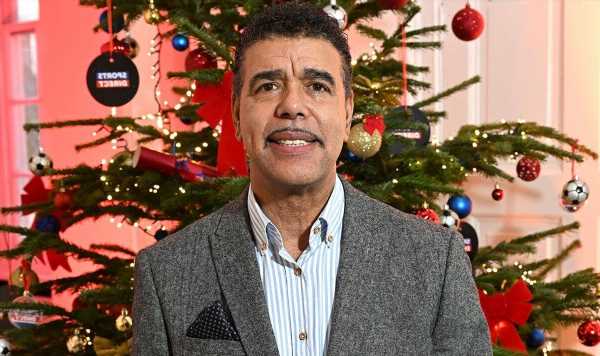Chris Kamara discusses his apraxia diagnosis
We use your sign-up to provide content in ways you’ve consented to and to improve our understanding of you. This may include adverts from us and 3rd parties based on our understanding. You can unsubscribe at any time. More info
On Wednesday, December 14, Chris Kamara: Lost For Words aired for the first time on TV. “When I was a footballer, I gave it my all,” Kamara, best known as Kammy, began. “Im so weak now,” he said, referencing his condition apraxia, which not only affects his speech.
The “very rare condition” means that “some days, [Kammy] can’t talk at all”, but it also means his “co-ordination is not very good [and his] balance is not very good”.
“My apraxia is known as primary apraxia of speech,” said Kammy, which means “doctors don’t know what caused it”.
Visiting consultant neurologist Dr Oliver Lily, the doctor who diagnosed him with apraxia of speech, viewers learned what could lead to the condition.
There are “different causes”, said Dr Lily, but Kammy’s “scans are normal, no strokes, no head injuries”.

Explaining that there is a build of the protein tau in the brain for people who have the condition, which damages the nerve cells, researchers aren’t aware how or why this occurs.
“We don’t have treatment to get rid of it,” said Dr Lily. “Research [in this area] goes very slowly.”
Kammy currently wears an ankle tag that helps to spark his brain into action, enabling him to get speech out.
“You’re much more fluent and confident than when I saw you a year ago,” Dr Lily said to Kammy.
“It’s a case of living with it… speech could deteriorate, and it’s a precarious position to be in. But you still need to live your life and do your best.”
When Kammy was first diagnosed with apraxia, he said he “wanted to give up”.
He said: “I felt embarrassed, felt I couldn’t go on.” There were days when he wanted to wake up, and the condition wouldn’t be there anymore – “but it never happened”.
While there is “no known cures”, Kammy was “advised to take vitamin supplements”, wears his ankle cuff, and does exercises.
The former Soccer Saturday presenter wants to highlight childhood apraxia of speech.
While rare, the condition requires intensive speech therapy which, for many, could not come soon enough.
Early intervention is key in helping children to make the most of their speech capabilities.
The Mayo Clinic points out the early indicators of apraxia of speech in children.
Early sign could include the delayed onset of first words, a limited number of spoken workers, and the ability to form only a few consonant or vowel sounds.
“These symptoms are usually noticed between ages 18 months and two years,” the Mayo Clinic notes.
As children produce more speech, usually between the ages of two and four, there could be:
- Vowel and consonant distortions
- Separation of syllables in or between words
- Voicing errors, such as “pie” sounding like “bye”.
Source: Read Full Article
